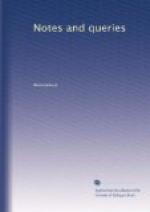The following extracts from the Travels of Sir William Brereton may answer the inquiry respecting the ships called “Whelps":—
“Waterford, 25 July, 1635. About six hour I went aboard one of the kings ships, called the ninth whelp, which is in the king’s books 215 ton and tonnage in kings books. She carries sixteen pieces of ordinance, two brass rakers, six iron demiculverin drakes, four iron whole culverin drakes, and four iron demicannon drakes. They are called drakes. They are taper-bored in the camber, and are tempered with extraordinary metal to carry that shot; these are narrower where the powder is put in, and wider where the shot is put in, and with this kind of ordinance his majesty is much affected. This ship is manned with sixty men.”—p. 164.
“1627. This 26th of February, attending the officers of the navy at Sir Sackville Crowes house by Charing Cross, Sir John Pennington came thither to acquaint them with a warrant from the Lord Duke (of Buckingham) directed to him and myself, for present bargaining with the yard keepers of the river for the building of ten small vessels, for the enterprise of Rochel, of some 120 tons a piece, with one deck and quarter only, to row as well as sail. The 28th of the same month we concluded our bargains with the general yard keepers, and drew convenants between us, and delivered to them accordingly. In this business I was employed till the latter end of July that the ships set sail to Portsmouth. My son John was placed captain in the sixth whelp, built by my kinsman Peter Pett. Having liberty from my lord Duke to make choice from among them all, I chose that pinnace before the rest, supposing she would have proved the best, which fell out afterwards cleane contrary. The 4th September my son John took leave of me in the evening, and went on board his ship, whom I never saw after, being unfortunately cast away in the return from Rochel.
“1628. In this interim I received certain intelligence of the great loss of my son John, his ship and all his company, who foundered in the sea about the Seames in a great storm, about the beginning of November; not one man saved to bring the doleful news, nor no ship near them to deliver the certainty but a small pinnace belonging to the fleet that was within ken of her, and saw her shoot nine pieces of ordinance hoping of succour.”—Journal of Phineas Pett. MSS. in Brit. Mus. 9298.
“At the return of this fleet (from Rochel) two of the whelps were cast away, and three ships more, and some five ships who had some of those great stones, that were brought to build Pauls, for ballast and for other uses within them, which could promise no good success, for I never heard of any thing that prospered which being once designed for the honour of God was alienated from that use.”—Howel’s Letters, sect. v. lett. 9.
The name whelp was probably given them facetiously in reference to their designation as barks.




